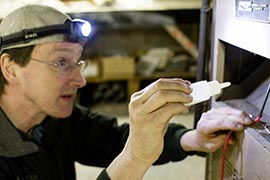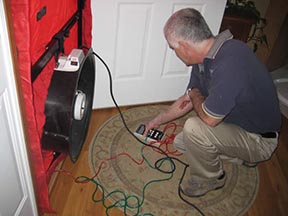Energy Audit
Click here to learn more about insulation rebates up to $8,000.
 An energy audit can be a logical first step toward reducing energy waste. Energy advisors perform various tests to determine the best energy savings opportunities and provide suggestions on projects that can address potential health and safety issues including moisture, mold, and radon. Energy audits can include a walk-through of the entire home and tests using a blower door, combustion safety equipment, and a thermal camera.
An energy audit can be a logical first step toward reducing energy waste. Energy advisors perform various tests to determine the best energy savings opportunities and provide suggestions on projects that can address potential health and safety issues including moisture, mold, and radon. Energy audits can include a walk-through of the entire home and tests using a blower door, combustion safety equipment, and a thermal camera.
 Blower Door Test: Using a large fan that fits into a doorway, an energy advisor can determine how airtight or leaky your house is and whether air sealing is recommended. During the blower door test, the energy advisor may examine the home with a thermal camera to identify potential sources of air leakage. Identifying and sealing leaks in your home can save hundreds of dollars in energy costs per year. Click here to find a contractor near you.
Blower Door Test: Using a large fan that fits into a doorway, an energy advisor can determine how airtight or leaky your house is and whether air sealing is recommended. During the blower door test, the energy advisor may examine the home with a thermal camera to identify potential sources of air leakage. Identifying and sealing leaks in your home can save hundreds of dollars in energy costs per year. Click here to find a contractor near you.
Combustion Safety Testing: Energy advisors can also conduct combustion safety testing on boilers and furnaces to ensure that they are operating efficiently and venting properly.
Thermal Camera: Thermal (or infrared) cameras allow trained users to identify upgrade opportunities such as missing insulation.
Indoor Air Quality: An energy advisor may recommend steps to reduce moisture or improve indoor air quality. Those steps can eliminate potential hazards and improve the comfort and longevity of your home.
Recommendations: After conducting an energy audit, an energy advisor may provide you with recommendations to make your home more efficient and comfortable. Some advisors provide extensive reports and computer modeling of your home while others may provide only a checklist of the most important items to address.
